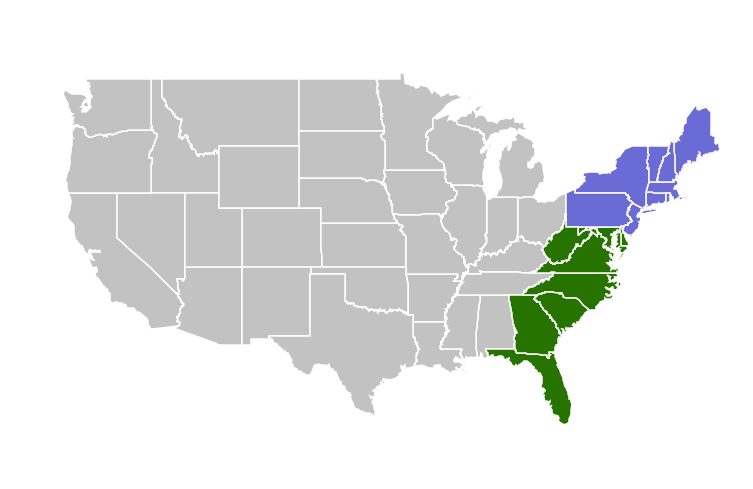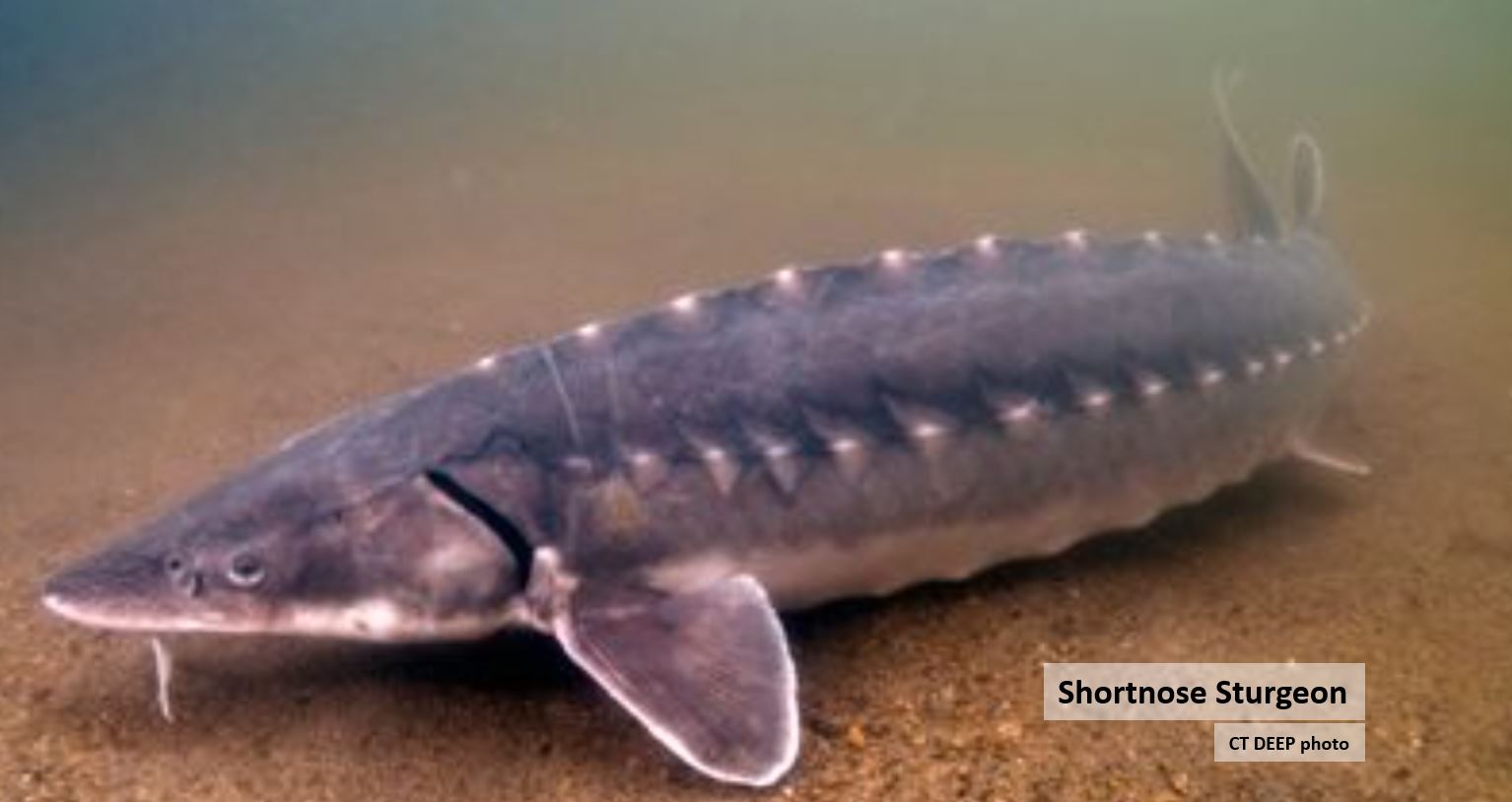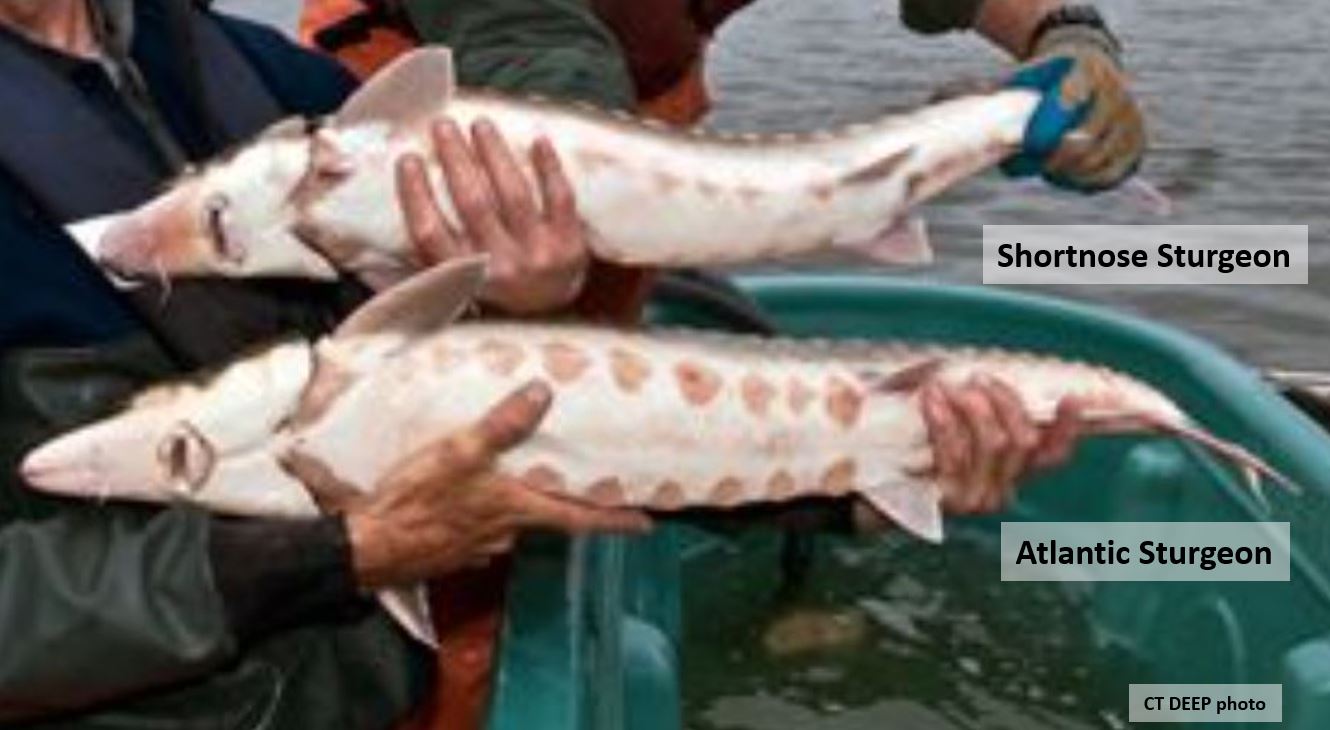Report a Stranded, Injured, or Dead Sturgeon
Generic Clearance for Citizen Science and Crowdsourcing Projects
Report a Stranded, Injured, or Dead Sturgeon
NMFS - Sturgeon Salvage Network
OMB: 0648-0828
Report a Stranded, Injured, or Dead Sturgeon
Reporting a stranded, injured, or dead sturgeon is the best way to make sure professional responders and scientists know about it and can take appropriate action.
Table of Contents
The Sturgeon Salvage Program is a network run by NOAA Fisheries to help conserve Atlantic and shortnose sturgeon. Information regarding deceased sturgeon that wash up on riverbanks and ocean beaches is sent to NOAA Fisheries through this network. Numerous partners along the Atlantic coast are trained and ready to respond.
You can help us learn more by reporting any sturgeon you may come across. This allows scientists to collect samples and data to better understand sturgeon populations, track recovery efforts, identify threats to the species and fill in gaps in our knowledge.
If you see a stranded, injured or dead sturgeon, immediately contact your local salvage partner (phone numbers provided below).
You can also use our contact NOAA Fisheries at (978) 281-9328 or in the Southeast at (844) STURG-911 or (844) 788-7491, or send us an email at [email protected].
New England/Mid-Atlantic region is shown in purple. Southeast region is shown in green.
New England/Mid-Atlantic
Regional
Phone: (978) 281-9328
Email: [email protected]

Note: The reporting app for the Connecticut is shown below. Similar information is collected for the other states listed below the Connecticut example.
Connecticut
Connecticut Department of Energy and Environmental Protection
Report a Sturgeon to CT DEEP

Welcome to the CT DEEP Sturgeon Sighting Survey. Report your sturgeon sightings by completing this survey. The data submitted by you and other citizen scientists will assist CT DEEP with tracking sturgeon sightings. Sightings we are interested in hearing about include breaches, strandings, observations of dead sturgeon, or anything unusual involving a sturgeon! Only one type of sturgeon observation can be submitted for each report. Please complete a report for each type of sturgeon encounter you observe. Thank you for taking the time to help CT DEEP track sturgeon observations!
Date and time of sighting
Please provide the date and time of when you saw the Sturgeon to the best of your ability.



Nearest Town or Port of sighting
Please tell us the nearest town or port to where you saw the Sturgeon to the best of your ability.
 Sighting
location
Sighting
location
The map will attempt to use your device's location to place the point. If you are no longer at the location of the sighting, please tap or click the map once to move the dot on the map, and drag the map with a finger or mouse to move the map to where you saw the Sturgeon.
To place the geopin at specific latitude and longitude coordinates, please follow this format: 41.000000N 72.000000W
Tip: This question will try to use your location. Press to continue.

Zoom in
Zoom out
Home
Find my location
Esri, GEBCO, DeLorme, NaturalVue | Esri, GEBCO, IHO-IOC GEBCO, DeLorme, NGS
Powered by Esri
Lat: 41.42213 Lon: -72.54822
Alternative way to enter Sighting Location
If you prefer, you may type latitude and longitude coordinates here rather than using the map
 Two
kinds of Sturgeon are present in CT waters
Two
kinds of Sturgeon are present in CT waters
Connecticut has two species of sturgeon. The two species look very similar. If the sturgeon is 48" or longer, it is an Atlantic Sturgeon. Shortnose Sturgeon don't get much over 40" long. To tell these two apart at smaller sizes, look at the underside, in particular, look at the mouth. Shortnose Sturgeon have a wider mouth opening (inside the lips) than similarly sized Atlantic Sturgeon.
In this photo, the fish on top with the wider mouth is a Shortnose Sturgeon. The fish on the bottom with the narrower mouth is an Atlantic Sturgeon.

Sturgeon Sighting Details
Please tell us which species of Sturgeon you observed
(If you can)
 Atlantic
Sturgeon
Atlantic
Sturgeon Shortnose
Sturgeon
Shortnose
Sturgeon Unsure
Unsure
What did you observe?
Please select one of these options from the drop-down list:

-Please select-
How
many
sturgeon did you observe? What
size were the sturgeon?
What
size were the sturgeon?
If you are able to estimate the size of the fish, please select one of the options below:
 <
1 foot
<
1 foot 1-2
ft long
1-2
ft long 2-3
ft long
2-3
ft long 3-4
ft long
3-4
ft long 4-5
ft long
4-5
ft long 5-6
ft long
5-6
ft long >
6 feet
>
6 feet
Would you describe the size of the sturgeon some other way?
(for example, please indicate if there were multiple sizes or if you aren't able to estimate the size)
 1000Photos
1000Photos
If you have a photo you'd like to share with us, upload here.
1
Select image file (maximum number of files allowed: 2)
Anything
else you want to tell us about this Sturgeon Sighting? 500
500
Please provide your contact Info
This will allow staff to contact you if we have questions.
Name
(optional) Email
(optional)
Email
(optional) Phone
(optional)
Phone
(optional)
Please submit a 10-digit phone number with no hyphens or parenthesis

Submit
Delaware
Delaware Division of Fish and Wildlife
For assistance with the form, please e-mail the DNREC Fisheries Section, [email protected] , or call (302) 735-8663.
Maine
NOAA Fisheries Greater Atlantic Regional Office
Phone: (978) 281-9328
Email: [email protected]
Maryland
Maryland Department of Natural Resources
Phone: (410) 643-6788
Massachusetts
NOAA Fisheries Greater Atlantic Regional Office
Phone: (978) 281-9328
Email: [email protected]
New Hampshire
NOAA Fisheries Greater Atlantic Regional Office
Phone: (978) 281-9328
Email: [email protected]
New Jersey
New Jersey Division of Fish and Wildlife
Phone: (609) 748-2020
Email: Heather Corbett, [email protected]
New York
New York Department of Environmental Conservation
Rhode Island
Rhode Island Department of Environmental Management, Division of Marine Fisheries
Phone: (401) 423-1923
Virginia
Virginia Commonwealth University
Phone: (804) 827-0236
Email: Matthew Balazik, [email protected]
Southeast
For sturgeon found in North Carolina through Florida, contact the NOAA Fisheries, Southeast Region at 1-844-STURG 911 (1-844-788-7491) or via email at [email protected].
More Information
Last updated byGreater Atlantic Regional Fisheries Officeon 06/02/2022
| File Type | application/vnd.openxmlformats-officedocument.wordprocessingml.document |
| Author | Joe.I.Terry |
| File Modified | 0000-00-00 |
| File Created | 2023-08-19 |
© 2026 OMB.report | Privacy Policy